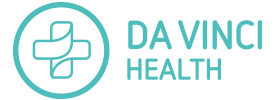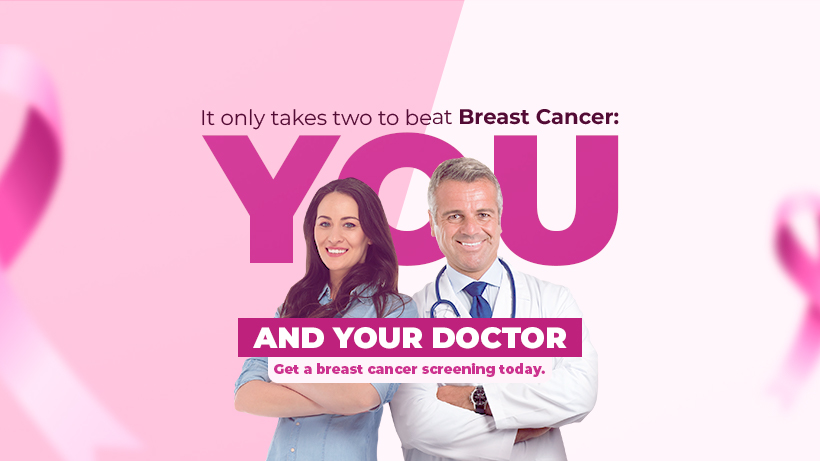According to the World Health Organization, breast cancer is the most common type of cancer in females worldwide. It affects 1 in 8 women, and there’s an estimated number of 43,550 of them that will die from breast cancer this year only in the U.S.
Fortunately, if cancer is detected and treated early, the cure rate is up to 98%. Also, with continually improving treatments, screenings, and lots of awareness, death rates and major risks decrease significantly.
If you have noticed signs of alarm like lumps, changes in the shape and color of your breast, or your family has a history of any type of cancer, keep reading this blog to learn three ways to prevent breast cancer, the most common myths about it and how our medical team at Da Vinci Health can help screen, diagnose and treat you to get a cancer-free life.
What is breast cancer screening?
The American Society of Clinical Oncology explains cancer occurs when healthy cells in the breast change and grow out of control, forming a mass or sheet of cells called a tumor. Tumors can be cancerous or benign. Cancerous tumors are malignant, which means they can spread to other parts of the body. Meanwhile, a benign tumor can grow but doesn’t spread.
Breast cancer screening is the method to examine and diagnose through multiple tests to look for cancer before any symptoms or signs show up. Screenings can be applied in several ways; however, no matter which method is used, they all share the same goal: to detect cancer at an earlier stage so it is most curable.
Some types of cancer have their own screening tests, while others don’t. And so, what are the tests to detect breast cancer? There are three main methods: self-exam, mammogram, and ultrasound.
- Self-exam: this is the way to do a breast cancer screening at home. During this self-examination, you look for changes in your breasts through touch and sight.
- Mammogram: an x-ray of the breast. During this test, the breast is exposed to a small amount of ionizing radiation that allows specialists to examine the breast tissue for any suspicious areas.
- Ultrasound: a scan that uses sound waves to generate a picture of what’s happening inside the breast tissue. These are commonly used when something suspicious is detected in your breast through a breast self-exam or mammogram.
Preventing cancer is teamwork. That’s why when you get a breast cancer screening, you’re helping not only yourself but your doctor to find cancer at an earlier, more treatable stage which translates to better survival chances.
Myths about breast cancer
Even though breast cancer awareness has increased over the years, there’s still a lot of misinformation. Some people think breast cancer is contagious or caused by wearing underwired bras, having implants, caffeine, or even using cell phones. The truth is these are all myths, but the list goes on. Some of the most common wrong beliefs about breast cancer you should know and discard are:
Mammograms are painful
Some patients are afraid of having a mammogram because “they’re painful.” Usually, they have been told this by another person when in truth, taking this test is very simple and easy to tolerate.
High radiation exposure
Radiation exposure during breast cancer screenings is minimal. This is equal to less than what you’re already exposed to through environmental radiation in 1 year or a 1-hour flight.
Bad expectations
Some women procrastinate taking tests because they’re afraid of getting a bad result. The scariest scenario is not checking up on your body and developing advanced invasive cancer due to late detection.
How to prevent Breast Cancer?
Breast cancer affects women of all ages worldwide. Women over 40 years old are a risky group; however, breast cancer can be even more serious in younger patients because it behaves more aggressively.
Getting breast cancer screening is the best way to prevent it. We recommend you start with the basics, which is practicing a monthly self-exam at home. Then, book a mammogram every year if you’re over 40 or an ultrasound if you’re still a young adult or adolescent.
You can focus further on prevention by being aware of the risk factors. A risk factor is something that may increase the chance of getting a disease. According to the National Breast Cancer Foundation, 60-70% of people with breast cancer may have no connection to these risk factors, while others with risk factors will never develop cancer. Most patients will never know exactly what caused their cancer. However, there are a few established risk factors that are associated with breast cancer, and you should know about them.
Risk factors for breast cancer are divided into two categories: genetic and environmental. Genetic risk factors include:
- Having dense breasts.
- Early menstruation (before age 12) or late menopause (after 55).
- Having your first child at an older age or never having given birth.
- Relatives that have been diagnosed with breast or ovarian cancer.
- Being diagnosed with breast cancer in one breast increases the risk of being diagnosed with breast cancer in the other breast in the future.
- Being of the Caucasian race.
- Being obese.
On the other hand, environmental risks are the ones associated with lifestyle and habits and past or ongoing treatments. For example:
- A sedentary lifestyle
- Unhealthy eating habits
- Smoking
- Frequent consumption of alcohol
- Having radiation therapy to the chest before the age of 30
- Taking combined hormone replacement therapy (As the ones for menopause)
See? There’s no excuse for not taking measures to prevent breast cancer. Identify which risk factors may affect your health, check your breasts regularly and schedule your screening once a year. Following these tips, you’ll be closer to living a healthy, cancer-free life.
It takes two to beat breast cancer. You and your doctor
A breast cancer screening is made to see what you alone can’t see. Many cancer symptoms are invisible until they’re recognized by a professional, while others can be detected early just by being aware of your breast health.
If you find any symptoms or signs of alarm, they should be checked immediately by a professional. If you have no symptoms at all, good for you! However, prevention is key to survival. So, even if you have no symptoms, it’s important to schedule a breast cancer screening.
At Da Vinci Health, we have the best technology for early and accurate detection. During your visit, our doctors will ask about your personal and family medical history and perform the recommended tests based on your age and current conditions. If we detect a tumor, we’ll provide you with the best advice and treatment at any stage of the illness.
You, your family, and we are all in this together. Book your appointment, get a screening, and if there’s something suspicious to take care of, we’ll help you beat cancer starting now when it comes to breast cancer, every second counts. Visit our website and schedule a breast cancer screening today.


